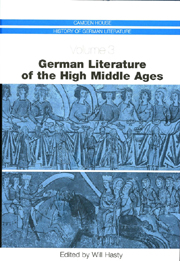Book contents
- Frontmatter
- Contents
- List of Illustrations
- Acknowledgments
- Introduction
- Part I The First Flourishing of German Literature
- Part II Lyric and Narrative Traditions
- Part III Continuity, Transformation, and Innovation in the Thirteenth Century
- Wirnt von Gravenberg's Wigalois and Heinrich von dem Türlin's Diu Crône
- Der Stricker
- Rudolf von Ems
- Ulrich von Liechtenstein
- Konrad von Würzburg
- Wernher der Gärtner
- Part IV Historical Perspectives
- Bibliography
- Notes on the Contributors
- Index
Der Stricker
from Part III - Continuity, Transformation, and Innovation in the Thirteenth Century
Published online by Cambridge University Press: 05 February 2013
- Frontmatter
- Contents
- List of Illustrations
- Acknowledgments
- Introduction
- Part I The First Flourishing of German Literature
- Part II Lyric and Narrative Traditions
- Part III Continuity, Transformation, and Innovation in the Thirteenth Century
- Wirnt von Gravenberg's Wigalois and Heinrich von dem Türlin's Diu Crône
- Der Stricker
- Rudolf von Ems
- Ulrich von Liechtenstein
- Konrad von Würzburg
- Wernher der Gärtner
- Part IV Historical Perspectives
- Bibliography
- Notes on the Contributors
- Index
Summary
DER STRICKER (THE WEAVER, ca. 1190–1250), who flourished in the first half of the thirteenth century, is known chiefly for his short verse narratives and fables, of which approximately 170 have survived. In addition, he wrote two longer works: the Arthurian romance Daniel von dem Blühenden Tal (translated as Daniel of the Blossoming Valley by der Stricker) around the period 1210 to 1225, and, apparently somewhat later, the heroic epic Karl der Große (Charlemagne). It is generally accepted that these two major poems were written first, and that the shorter stories — which form the foundation of der Stricker's literary repute — are the product of his later years.
Der Stricker was among the earliest of the so-called “post-classical” German writers. Unlike many of the German poets of the High Middle Ages, Der Stricker appears not to have been a member of the chivalric order; he was in all likelihood a professional itinerant poet. While he spent a major portion of his life in present-day Austria, he appears to have been born somewhere in central Germany.
Like most of his contemporaries, little information is preserved about the life of Der Stricker. Even his name appears to be an assumed one. Despite some competing theories, a consensus exists among scholars that this probable pseudonym was meant to indicate a “weaver” or a “knitter.” If one accepts this explanation, then the poet, by calling himself “the weaver,” quite possibly meant to allude to his literary role as a weaver of stories.
- Type
- Chapter
- Information
- German Literature of the High Middle Ages , pp. 215 - 224Publisher: Boydell & BrewerPrint publication year: 2006



